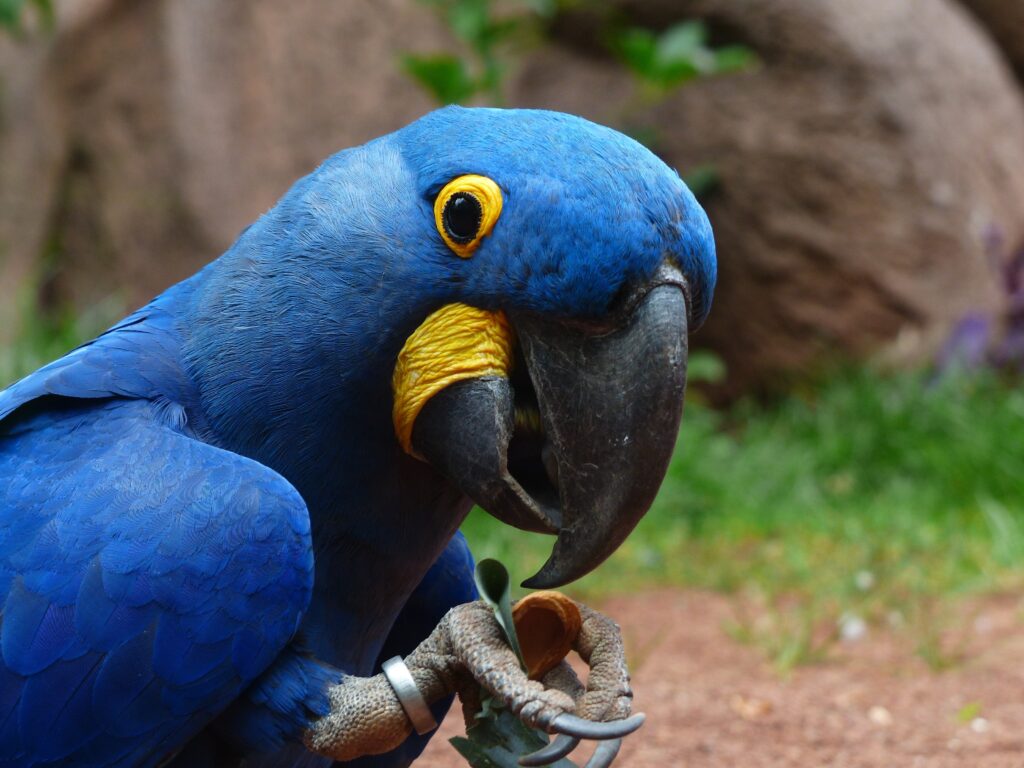Nine Ways To Keep Your Birds Healthy And Free Of Illnesses

Ways To Keep Your Birds Healthy And Free Of Illnesses so you’re not tired of constantly worrying about the health of your beloved birds. There are nine foolproof ways to ensure that your feathered friends stay healthy and free from illnesses. From monitoring their weight and examining their poop to providing mental stimulation and maintaining a clean environment, these simple yet effective techniques will keep your birds in tip-top shape. But that’s not all; there’s a lot more to discover. So, get ready to uncover the secrets of keeping your birds healthy and thriving, because your feathered companions deserve nothing but the best.
Proper Nutrition for Optimal Health
Are you providing your bird with the proper nutrition for optimal health? It is crucial to understand that a high-quality, species-appropriate diet is essential for your bird’s overall well-being. To ensure your feathered friend receives the necessary nutrients, offer a balanced diet consisting of fresh fruits, vegetables, seeds, pellets, and nuts. This combination provides a wide range of vitamins, minerals, and antioxidants, promoting a healthy immune system and vibrant plumage.
When selecting bird feeders, opt for those that can accommodate a variety of food options. This encourages natural foraging behaviors and allows your bird to choose its preferred diet. Additionally, consider incorporating native plants into your bird’s environment. Native plants not only provide a natural habitat but also attract insects, which serve as a valuable source of protein for your feathered companion.
While it may be tempting to offer high-fat or high-sugar treats to your bird, it is essential to avoid doing so. These threats can lead to obesity and various health issues, including liver disease and diabetes. Instead, focus on providing nutritious foods that support your bird’s dietary needs.
Remember to always ensure access to clean, fresh water. Water is vital for digestion and hydration, and birds should have access to it at all times. Regularly change the water and clean the water dishes to prevent bacterial growth.
To ensure you are meeting your bird’s specific nutritional requirements, consult with an avian veterinarian. They can help create a personalized nutrition plan tailored to your bird’s age, species, and individual needs.
Regular Veterinary Check-Ups
Regular veterinary check-ups are an essential aspect of maintaining your bird’s overall health and well-being. Just like humans, birds can develop various health issues that may not be immediately noticeable. By scheduling regular check-ups with an avian veterinarian, you can ensure that any potential disorders are detected early and managed effectively.
Annual vet visits should be a part of your bird’s overall care routine. During these visits, the veterinarian will conduct a thorough examination of your bird, including checking its feathers, beak, eyes, and feet. They will also listen to its heart and lungs and perform any necessary diagnostic tests. These check-ups are crucial for monitoring your bird’s health, identifying any signs of illness, and providing appropriate treatment or preventive measures.
Different bird species may have specific health concerns, so it is important to find a veterinarian with avian expertise. They will be familiar with the unique needs and common ailments of your bird’s species, ensuring comprehensive care. Additionally, avian veterinarians can provide guidance on proper nutrition, vaccinations, and parasite prevention protocols specific to your bird.
Responsible pet owners prioritize regular veterinary care for their animals. By being proactive and scheduling regular check-ups, you can help ensure the long-term health and well-being of your feathered friend. Remember, prevention is always better than cure. Regular veterinary check-ups provide an opportunity to address any health concerns before they become more serious and potentially life-threatening. So, don’t wait for obvious signs of illness to appear. Make those regular vet appointments and keep your bird healthy and illness-free.
Maintaining a Clean and Hygienic Environment
To maintain a clean and hygienic environment for your birds, it is important to follow proper cage sanitation practices. This includes regularly cleaning the cage and removing any soiled bedding. Additionally, establish a routine for cleaning shared feeders and waterers to prevent the spread of bacteria or diseases. Don’t forget to disinfect any accessories, such as perches or toys, to ensure a healthy living space for your birds.
Proper Cage Sanitation
Maintaining a clean and hygienic environment for your birds is essential for their overall health and well-being. Proper cage sanitation plays a crucial role in preventing the buildup of harmful bacteria and pathogens that can affect your birds’ health. Regularly clean and disinfect the cage to ensure a clean and safe living space for your feathered friends.
Remove and replace soiled bedding and droppings to prevent the accumulation of waste, which can attract pests and cause respiratory issues. Clean food and water dishes daily to prevent contamination and the spread of diseases. It is also important to ensure that the cage is well-ventilated to prevent the accumulation of moisture, which can lead to mold and bacterial growth. Use bird-safe cleaning products to avoid exposing your birds to harmful chemicals. By implementing proper cage sanitation practices, you can create a healthy and hygienic environment that promotes your birds’ well-being.
Regular Cleaning Routine
To ensure the cleanliness and hygiene of your bird’s cage, it is crucial to establish a regular cleaning routine that effectively eliminates harmful bacteria and maintains a safe living environment for your feathered companions. Birds are susceptible to various diseases and infections, so it is essential to keep their surroundings clean and free from potential health hazards.
Begin by removing any uneaten food, droppings, and debris from the cage daily. Use a mild detergent and warm water to clean the cage thoroughly at least once a week. Pay close attention to perches, toys, and feeding dishes, as they can harbor bacteria and germs. Regularly replace bedding material or liners to prevent the accumulation of waste. By implementing a regular cleaning routine, you can minimize the risk of illness and provide a healthier environment for your birds.
Disinfecting Bird Accessories
Regularly disinfecting bird accessories is essential for maintaining a clean and hygienic environment for your feathered friends. Bird feeders and waterers should be cleaned and disinfected regularly to prevent the spread of diseases. The entire bird cage, including perches and toys, should also be cleaned and disinfected to ensure a healthy living space. It is important to use bird-safe cleaning products to avoid exposing your birds to harmful chemicals.
Additionally, changing and cleaning the bird’s bedding regularly is crucial to prevent the build-up of bacteria and pathogens. When disinfecting bird accessories and toys, consider using a bleach solution. This solution can be made by mixing one part bleach with nine parts water. Thoroughly clean the accessories and toys with the bleach solution, rinse them well, and allow them to air dry before reintroducing them to your birds.
Providing Mental Stimulation and Enrichment
To ensure optimal mental well-being for your bird, it is crucial to provide a wide selection of stimulating toys, perches, and activities that alleviate boredom and engage their mind. Backyard birds, like any other pets, require mental stimulation and enrichment to prevent boredom and promote a healthy, happy life. One way to achieve this is by offering a variety of toys that cater to their natural instincts. Birds enjoy toys that they can interact with, such as puzzle toys or toys that require problem-solving skills. Additionally, rotating toys regularly can keep your bird engaged and mentally active.
Another important aspect of mental stimulation is encouraging foraging behavior. This mimics their natural feeding habits in the wild and provides mental stimulation. You can hide treats or food in different areas of their cage or create foraging toys that require them to work for their food. This not only keeps them mentally stimulated but also provides physical exercise.
Social interaction and out-of-cage time are also vital for your bird’s mental well-being. Birds are social creatures and enjoy the company of their human caregivers. Spend time interacting with your bird, talking to them, and providing opportunities for them to explore outside of their cage. This will keep them mentally engaged and prevent loneliness and boredom.
Lastly, offering challenges like puzzle toys or training exercises can provide mental enrichment for your bird. Birds are intelligent creatures and enjoy learning new things. Teaching them tricks or providing them with tasks to solve can keep their minds sharp and engaged.
Regular Exercise and Physical Activity
Providing mental stimulation and enrichment is essential for the well-being of backyard birds, and another crucial aspect to ensure their overall health is regular exercise and physical activity. Just like humans, birds need to stay physically active to maintain their fitness levels and prevent health issues. Incorporating regular exercise and physical activity into their daily routine will keep your birds healthy and happy.
Encouraging regular flight or movement within a safe and supervised environment is an excellent way to ensure that your birds get the exercise they need. If you have a large aviary, make sure there is plenty of space for your birds to fly around. If your birds are kept in cages, consider providing them with supervised playtime outside of their enclosure. This will allow them to stretch their wings and engage in natural movements.
In addition to flying, it’s important to provide opportunities for climbing, wing flapping, and other natural movements. You can install perches, branches, or ladders in their cage or aviary to encourage these activities. This will not only keep them physically active but also stimulate their muscles and joints.
Engaging your birds in play activities is another great way to ensure they get regular exercise. Foraging for food or using toys that require physical interaction will keep them mentally and physically stimulated. You can hide treats or toys around their enclosure to encourage them to move around and explore.
While exercise is crucial, it’s essential to monitor the time your birds spend out of their cage for physical activity. Avoid overexertion, as this can lead to exhaustion or stress. Make sure they have enough time for rest and relaxation after their exercise sessions.
Lastly, keep your birds engaged and motivated by incorporating variety and novelty into their exercise routines. Introducing new toys, changing the arrangement of perches, or providing different types of obstacles will prevent boredom and encourage them to stay active.
Minimizing Stress and Promoting a Calm Atmosphere
Creating a calm and stress-free environment is crucial for promoting the well-being and emotional health of your birds. By minimizing stress and promoting a calm atmosphere, you can prevent the spread of illnesses and ensure the overall health of your feathered companions.
One way to minimize stress is to provide a stable and consistent daily routine for your birds. Birds thrive on routine, so it’s important to establish regular feeding, sleeping, and playtime schedules. This helps them feel secure and reduces their anxiety levels.
In addition to a stable routine, creating a safe and quiet environment is essential. Birds are sensitive to disruptions, so it’s important to minimize loud noises and sudden changes in their surroundings. Avoid playing loud music or having noisy gatherings near their living area. This will help maintain a calm atmosphere and prevent unnecessary stress.
To keep your birds engaged and prevent boredom, offer them mental stimulation and enrichment activities. Provide toys, puzzles, and foraging opportunities to keep their minds active. This will not only keep them entertained but also help reduce stress and anxiety.
Regularly monitoring and addressing any signs of stress or anxiety in your birds is crucial. Look out for behaviors such as feather plucking, excessive vocalization, or aggression. If you notice these signs, consult with a veterinarian or an avian specialist to address the underlying causes and ensure your birds’ emotional well-being.
Quarantine and Isolation for New Birds
When introducing new birds to your flock, it is crucial to implement a quarantine period of two to four weeks. This helps prevent the transmission of diseases and allows you to closely monitor the health of the new birds. During this time, it is important to avoid contact with the new birds or their waste to prevent cross-contamination. By strictly following these quarantine measures, you can ensure the health and well-being of your entire flock.
Importance of Quarantine
Quarantine is a crucial step in ensuring the health and well-being of new birds before introducing them to the flock. The importance of quarantine cannot be overstated when it comes to keeping your birds healthy. During this period, which typically lasts two to four weeks, you must prevent cross-contamination and avoid contact with the new birds or their waste. This is essential for preventing the spread of any potential illnesses that the new birds may be carrying.
By closely monitoring the new birds for any signs of illness during quarantine, you can promptly address any health issues that may arise. Only after the quarantine period should you consider integrating the new birds into the flock. By following these quarantine protocols, you can significantly reduce the risk of introducing diseases to your existing flock and keep all of your birds healthy and thriving.
Duration of Isolation
During the period of isolation for new birds, it is essential to adhere to strict quarantine protocols in order to safeguard the health and well-being of your flock. The duration of isolation should be at least two to four weeks. This timeframe allows for the observation of any potential signs of illness in the new birds. It is crucial to prevent cross-contamination during this period, so avoid any contact with the new birds or their waste.
Close monitoring is necessary to detect any symptoms of illness, such as changes in behavior, appetite, or droppings. By isolating new birds, you can prevent the spread of diseases and parasites that may be harmful to your flock. Only after the completion of the quarantine period should you integrate the new birds into your existing flock.
Preventing Disease Transmission
To ensure the health and well-being of your flock, it is imperative to adhere to strict quarantine protocols when introducing new birds. Quarantine new birds for two to four weeks before integrating them into the flock. This period allows you to monitor the new birds closely for any signs of illness. During quarantine, it is crucial to prevent cross-contamination.
Avoid contact with the new birds or their waste to minimize the risk of disease transmission. Keep the new birds in a separate area, ensuring that they have their own feeders, waterers, and equipment. As an additional precaution, wash your hands thoroughly after handling the new birds or their belongings. By following these quarantine and isolation practices, you can greatly reduce the chances of disease transmission and keep your birds healthy.
Implementing Biosecurity Measures
By limiting contact with wild birds, implementing visitor access restrictions, and regularly disinfecting your coop and equipment, you can effectively prevent the transmission of diseases and maintain a healthy flock. These biosecurity measures are crucial in keeping your birds safe and preventing the spread of illnesses.
To begin, it is important to limit contact between your birds and wild birds. Wild birds can carry a wide variety of diseases, such as avian influenza, which can be easily transmitted to your flock. By keeping your birds in an enclosed area and preventing wild birds from accessing their environment, you reduce the risk of disease transmission.
Another important measure is to implement visitor access restrictions. Visitors can unknowingly bring in diseases on their clothing or shoes, which can then be transferred to your birds. By limiting access to your coop and requiring visitors to follow proper biosecurity protocols, such as washing their hands and wearing protective clothing, you can greatly reduce the risk of disease introduction.
Regularly disinfecting your coop and equipment is also crucial in maintaining a clean and disease-free environment. Use appropriate disinfectants and follow the manufacturer’s instructions to ensure effective cleaning. Pay special attention to high-touch areas such as feeders, waterers, and perches.
Additionally, practicing good hygiene is essential. Wash your hands thoroughly after handling birds and avoid sharing equipment between different flocks. This will help prevent the spread of diseases within your own flock and to other birds.
Monitoring and Controlling Parasites
To keep your birds healthy and illness-free, it is crucial to monitor and control parasites. Implementing effective parasite prevention methods is key to maintaining your bird’s well-being. Regular health check-ups and consultations with a veterinarian will help you identify and address any potential parasitic infections.
Parasite Prevention Methods
Regularly inspecting and cleaning bird feeders and water sources is essential for preventing the spread of parasites and maintaining the health of your feathered friends. Parasites can easily contaminate these areas, posing a risk to your birds. Use bird-safe cleaning products to ensure that cages and perches are free from parasites. It is also crucial to consult with an avian veterinarian to establish recommended parasite prevention protocols and treatments for your birds.
Monitoring your birds for signs of irritation, excessive scratching, or visible parasites is important in identifying and addressing any infestations promptly. Additionally, consider using natural and safe pest control methods to prevent parasites in the bird’s environment. Keep in mind that indoor cats can also be carriers of parasites, so take precautions to prevent their access to your birds and their living areas. By following these parasite prevention methods, you can help keep your feathered friends healthy and free of illnesses.
Regular Health Check-Ups
To ensure the constant health and well-being of your feathered companions, it is crucial to prioritize regular health check-ups and monitoring for the control of parasites. Schedule routine check-ups with an avian veterinarian who can provide expert guidance on parasite prevention and control. During these check-ups, your veterinarian will conduct thorough examinations to detect any signs of parasite infestation or other health issues. They may recommend blood tests and health screenings to further evaluate your bird’s overall health and address any potential problems.
Following recommended vaccination and parasite prevention protocols is also key to keeping your birds healthy. Regularly inspecting the cage and perches for any signs of parasites, such as lice or mites, is important in preventing infestations. Using bird-safe cleaning products will also help maintain a healthy environment. By staying proactive and consistent with regular health check-ups, you can ensure that your feathered friends stay healthy and free of illnesses caused by parasites.
Effective Parasite Treatments
One key aspect of maintaining the health and well-being of your birds is effectively monitoring and controlling parasites. Parasites can have a devastating impact on your birds’ health, causing discomfort and potentially leading to serious illnesses. Regularly deworming your birds using appropriate medication and under veterinary guidance is crucial in preventing parasite infestations.
Additionally, keeping the living environment clean and dry can discourage parasites from taking hold. It is important to monitor your birds for signs of parasites such as excessive scratching, feather loss, or irritation. To further control parasites, you can use natural methods like diatomaceous earth or beneficial nematodes in the bird’s environment. However, it is always recommended to consult with an avian veterinarian to establish a parasite prevention and treatment plan tailored to your birds’ specific needs. By effectively monitoring and controlling parasites, you can ensure the health and longevity of your feathered friends.
Preventing Exposure to Toxins and Harmful Substances
To ensure the health and well-being of your feathered companions, it is essential to take proactive measures to prevent their exposure to toxins and harmful substances. By implementing a few simple actions, you can create a safe and healthy environment for your birds.
One important step is to be mindful of the cookware you use in your home. Non-stick cookware, when heated to high temperatures, can release toxic fumes that can be extremely harmful to birds. It is best to avoid using non-stick cookware altogether or ensure proper ventilation when cooking with them.
Another way to prevent exposure to toxins is by using bird-safe cleaning products. Harsh chemicals found in some household cleaners can be toxic to birds if they come into contact with them. Opt for natural or bird-specific cleaning products to ensure the safety of your feathered friends.
Regularly inspecting your bird’s environment is crucial in identifying and eliminating potential toxins or hazards. Check for any plants that may be toxic to birds and remove them from their reach. Additionally, be cautious of using pesticides or herbicides in areas accessible to your birds, as these chemicals can be harmful if ingested or inhaled.
It is also important to keep your birds away from lead-based paints. Lead is highly toxic to birds and can lead to serious health issues. If you have any lead-based paints in your home, it is recommended to have them safely removed or covered to prevent exposure.
Educating Yourself About Common Bird Illnesses and Symptoms
By familiarizing yourself with the common illnesses and symptoms that afflict birds, you can take proactive steps to ensure the well-being and health of your feathered companions. Understanding the devastating impact that illnesses can have on birds is crucial for their overall care. One common illness that can affect birds is Avian Influenza, also known as bird flu. This viral infection can have severe consequences and is highly contagious among birds. Symptoms of Avian Influenza include respiratory problems, such as coughing and sneezing, as well as decreased appetite and lethargy.
Another illness that can have a significant impact on birds is Psittacosis, also known as Parrot Fever. This bacterial infection primarily affects parrots but can also infect other species of birds. Psittacosis can be transmitted to humans, causing flu-like symptoms. Birds with Psittacosis may display symptoms such as difficulty breathing, nasal discharge, and weight loss.
It is also important to be aware of illnesses that affect the nervous system of birds. For example, Proventricular Dilatation Disease (PDD) is a viral infection that affects the digestive and nervous systems of birds. Birds with PDD may exhibit symptoms such as regurgitation, weight loss, and neurological signs like tremors and difficulty coordinating movements.
To ensure the health of your birds, it is essential to educate yourself about the specific diseases and symptoms that are common in the species you own. Regularly consult with avian veterinarians, stay updated on the latest research and information, and consider preventative measures such as vaccinations. By being proactive and knowledgeable, you can help keep your feathered companions healthy and free from common bird illnesses.
Ways To Keep Your Birds Healthy And Free Of Illnesses Frequently Asked Questions:
How Do You Keep Birds Healthy?
To keep your birds healthy, focus on bird nutrition and hygiene. Provide a balanced diet with fresh fruits and vegetables, clean their cages regularly, and offer clean water daily. Regular vet check-ups are also crucial for their well-being.
How Do You Prevent Bird Sickness?
To prevent bird sickness and keep your feathered friend healthy, follow these tips: monitor their weight, observe their poop, recognize signs of illness, schedule regular check-ups with an avian vet, and create a safe environment.
How Can We Help Protect Birds?
To help protect birds, support bird conservation efforts, and create bird-friendly habitats. By doing so, you can ensure the future of bird populations and contribute to the preservation of their habitats.
What Does a Bird Need to Survive?
To keep your birds healthy and free of illnesses, they need a balanced diet with nutritious food. They also require a suitable habitat that provides shelter, protection from predators, and access to clean water, and suitable nesting sites.
Conclusion
In conclusion, implementing these nine key strategies will greatly contribute to the overall health and well-being of your birds. By prioritizing proper nutrition, regular veterinary check-ups, maintaining a clean environment, providing mental stimulation and enrichment, regular exercise, practicing biosecurity measures, monitoring parasites, preventing exposure to toxins, and educating yourself about common bird illnesses, you can ensure that your feathered friends live a happy and illness-free life. Remember, a healthy bird is a happy bird!








